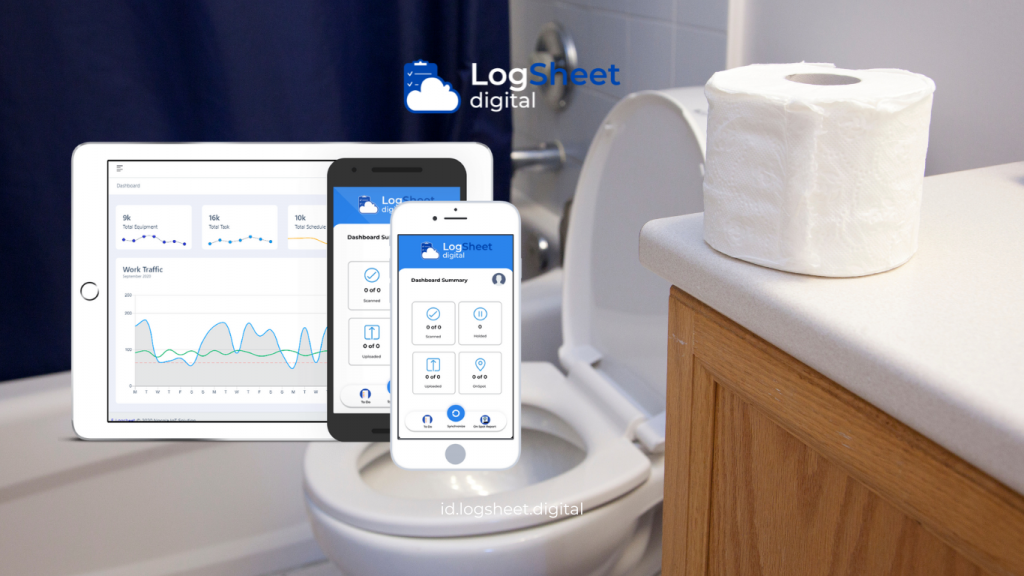In an increasingly advanced digital era, the transformation of industries towards Industry 4.0 has become a necessity. Industry 4.0 marks a revolution in manufacturing and business, utilizing digital technology to enhance efficiency, productivity, and quality. One crucial aspect of this transformation is the use of digital logsheets as a tool to ensure and improve product and process quality. This article will discuss Digital Logsheet for Quality 4.0 in Industry and how its implementation can positively impact the industry.
What is a Digital Logsheet?

Read More: Efficiency in Accident Reporting: Digital Logsheet in Safety Equipment
A digital logsheet is an electronic recording tool that replaces traditional manual log sheets or paper-based records. It is used to record important data related to various operational and quality aspects in the production process. Unlike manual log sheets based on paper, digital logsheets use information technology to store, manage, and analyze data more efficiently.
Benefits of Digital Logsheet in Quality 4.0

Read More: Successful Steps in Implementing Digital Logsheet in Quality Control
1. High Data Accuracy
Digital logsheets allow for more accurate data recording compared to manual methods. The use of digital forms and automated software reduces the likelihood of human error in data entry and calculations. This accuracy is crucial in industries requiring high-quality standards, such as manufacturing and production.
2. Ease of Data Access and Integration
A key advantage of digital logsheets is the ease of data access. Data stored in digital format can be accessed in real-time from various locations and devices. Integration with other management systems, such as ERP (Enterprise Resource Planning) and MES (Manufacturing Execution Systems), also allows for better data synchronization and faster decision-making.
3. Increased Operational Efficiency
With digital logsheets, the data recording and reporting processes become faster and more efficient. Automated data collection reduces manual workload and speeds up the analysis process. This efficiency not only saves time but also lowers operational costs. Additionally, it enhances productivity by streamlining processes and reducing manual workload. As a result, these improvements contribute to overall operational effectiveness and better resource management.
4. Improved Analysis and Reporting Capabilities
Digital logsheets often come with advanced analysis and reporting features. Collected data can be analyzed to identify trends, patterns, and anomalies that may not be apparent in manual reports. This capability aids in more informed decision-making and more effective quality improvement strategies.
5. Compliance with Regulations and Quality Standards
Many industries are required to comply with specific regulations and quality standards. Digital logsheets facilitate tracking and monitoring compliance with these standards. Audit trail features and accessible reporting simplify the auditing process and ensure that all procedures are followed correctly.
Implementing Digital Logsheet in Industry

Read More: Overcoming Challenges in Implementing Digital Logsheet in Logistics Environments
1. First Step: Needs Assessment and System Selection
The initial step in implementing a digital logsheet is assessing the specific needs of the industry and selecting an appropriate system. Each industry has unique data recording and reporting requirements; therefore, it is crucial to choose a digital logsheet system that can be effectively adapted to meet those needs. Moreover, selecting a system tailored to specific requirements not only ensures compliance but also enhances overall efficiency. Consequently, this tailored approach allows for seamless integration and better data management.
2. Training and Socialization
After selecting the right system, the next step is training and socializing the team who will use the digital logsheet. This training is essential to ensure that all users can utilize the system’s features optimally and understand the correct data recording procedures.
3. Integration with Existing Systems
Integrating the digital logsheet with existing systems, such as ERP and MES, is a crucial step to achieve optimal operational efficiency. This integration ensures that data from various sources can be automatically synchronized, resulting in improved accuracy and ease of analysis, which allows for quicker and more accurate decision-making.
4. Monitoring and Evaluation
Post-implementation, it is important to monitor the performance of the digital logsheet and conduct regular evaluations. This monitoring helps identify any issues or deficiencies that may arise and ensures that the system is functioning as expected.
5. Continuous Improvement
In a continuously changing world, ongoing improvement is key to maintaining competitive advantage. Regular evaluations and enhancements of digital logsheet features based on user feedback and technological advancements will ensure that the system remains relevant and effective.
Case Study: Digital Logsheet Implementation in the Manufacturing Industry

Read More: Digital Logsheet as a Warehouse and Logistics Operations Monitoring Tool
As an example of digital logsheet implementation, let’s look at a case study in the manufacturing industry. Company XYZ, involved in the production of electronic components, faced challenges in data recording and reporting. By adopting a digital logsheet, the company improved data accuracy, reduced recording time, and expedited the reporting process.
Before implementation, Company XYZ used manual logsheets, which required a lot of time to complete and process. After switching to a digital system, quality data could be recorded and analyzed in real-time. This system not only facilitated integration with the company’s ERP system but also enabled faster data access and, consequently, better decision-making. Moreover, by streamlining data flow between systems, it further enhanced operational efficiency and responsiveness.
As a result of this implementation, Company XYZ reported significant improvements in operational efficiency and customer satisfaction. Audit processes became easier, and reporting outcomes were more transparent, enhancing compliance with quality standards and industry regulations.
Conclusion

Read More: Digital Transformation in Warehouse Management: The Role of Digital Logsheets in Modern Logistics
Digital logsheet plays a crucial role as a pillar in achieving Quality 4.0 in industry. With benefits such as high data accuracy, ease of access, improved operational efficiency, better analysis capabilities, and compliance with regulations, digital logsheet helps companies enhance their product and process quality. Implementing digital logsheet requires needs assessment, training, integration, monitoring, and continuous improvement. The case study of digital logsheet implementation in the manufacturing industry demonstrates positive results, with improved efficiency and customer satisfaction.
With ongoing technological advancements, adopting digital logsheet is a strategic step to ensure that companies can compete and thrive in the Industry 4.0 era. Companies that successfully implement digital logsheets will be at the forefront in terms of quality and efficiency, better prepared to face future challenges.
This article provides a comprehensive overview of the role of digital logsheet in Quality 4.0 and how its implementation can bring positive changes in the industry. With a better understanding of the benefits and implementation process of digital logsheet, companies can leverage this technology to achieve competitive advantages and ensure high quality in their operations.






comments (0)